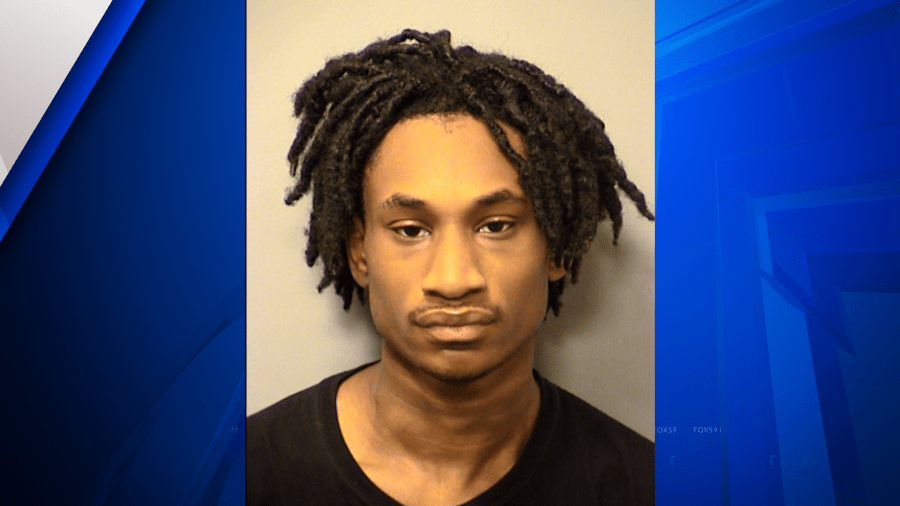INDIANAPOLIS — From the start, Marion Superior Judge Chris Miller told jurors hearing the case against Raymond Childs III that the path to justice would be emotional.
Childs is accused of killing four of his family members plus a pregnant woman and her unborn child at the home they all shared in the 3500 block of North Adams Street early on the morning of Jan. 24, 2021.
Childs’ sister told jurors the teenager feared a beating from his father for taking the family car without permission the night before.
During two days of testimony, there were stifled sobs and tears shed in the courtroom as family members heard how Raymond and Kezzie Childs, their 13-year-old daughter Rita, 18-year-old son Elijah and his 19-year-old girlfriend Kiara Hawkins and their near-term son were killed as Raymond III, 17 years old at the time, methodically went room-to-room in the split-level house, said prosecutors, and shot to death everyone who was home, chasing his 15-year-old brother Xavier into the freezing darkness, wounding him twice even as the surviving sibling offered his attacker the $44 cash he carried in his pocket with a promise not to tell, leaving bloodstained currency in the snow.
The feelings became even more raw Tuesday morning as a forensic pathologist described the fatal wounds of the victims accompanied by autopsy photographs.
That emotion boiled over from the witness stand in the afternoon as a key prosecution witness verbally confronted Childs in front of the jury, leading Judge Miller to send the panel from the courtroom so that he might huddle with attorneys, quiz individual jurors and declare a mistrial.
Miller told the jurors that there was, “great peril that a fair trial is not to be assured,” and told the court that he was, “firmly convinced that Mr. Childs cannot get a fair trial.”
This is after two jurors said they could remain fair and impartial but one juror said she could not.
“I appreciate your honesty,” said the judge.
Following a noon lunch break, that key witness, Elanso Valez, cousin to Childs’ father Raymond, who was called “Junior” by the family, testified that in the hours after the killings that Sunday morning, he retrieved Raymond III and drove him around Indianapolis.
Valez said he was present when Childs displayed the gun prosecutors claim was the murder weapon taken from the family home.
Childs wanted Valez to drive him to Gary to his biological mother’s house.
Instead, Childs stayed at Valez’s house in Plainfield where the teen and the man prayed for everyone involved in the killings to tell the truth.
Valez said that’s when Childs fell back on the bed, covered his eyes and cried.
“Y’all remember that?” Valez asked Childs from the witness stand.
Quickly, the defense and prosecution teams sought to cut Valez off, and as the judge was attempting to intercede from the bench, the witness then asked, “Why did you do it, Raymond?”
That led Judge Miller to send the jury from the courtroom and convene a conference with the attorneys before disappearing into his chambers for 35 minutes.
Upon his return, after Valez was reseated in the stand, the judge admonished the witness, “Your behavior has caused some concerns. Your behavior is inappropriate.”
Miller then solicited a promise from Valez to curb his comments or face a charge of contempt of court or potential jail time.
It was then that three jurors, one at a time, were brought back into the courtroom and questioned by the judge.
Two male jurors admitted that members of the jury had discussed the comments during the break and recognized the high emotions of the moment, yet they could remain fair and impartial.
One female juror said the comments had an impact on her and that it would be hard to remain impartial even though the judge cautioned the jurors that while they could not consider Valez’s specific comments, they could consider his demeanor.
Outside the courtroom, family members of the victims were dismayed by the mistrial declaration.
”I was thinking this is a problem,” said Roniqua Hawkins, mother of Kiara Hawkins. “Something I would have said but I was thinking about the mistrial, too. Just please have some self-control for us because it’s been three years, it’s been a long time, and we just want to get this behind us and move forward and we don’t want anything to get in the way of this.”
”It’s been difficult. It’s hard,” said Kiara’s grandmother Alisha Hooks. “It’s like living the day all over again but we trust God because we know God is going to give us the answers that we need.”
Judge Miller has set a 10 a.m. Monday status conference with the attorneys to determine how to put the trial back on track.


